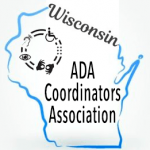Access: Connect. Learn. Share.
The Wisconsin ADA Coordinators Association strives to support ADA Coordinators in their work and to help Governmental entities and businesses in the communities of Wisconsin regarding the Americans with Disabilities Act (ADA), accessibility, and inclusion.
Next Webinar
Pathways to Inclusion: ADA Transition Planning for Pedestrian Accessibility
When
Friday – November 21, 2025
12 noon to 1:00 p.m. [Central Time]
Presenter
Dr. Delphine Labbé, University of Illinois – Chicago
Presentation
Contact
For questions and accommodations:
Rebecca Rabatin
Email: ADAWICoordinators@gmail.com
Phone: 414-226-8307
*Accommodation requests due by Tuesday, November 18.
Recent Webinar
Building Strong Community Relationships and Access
Presentation
More
Ask Your ADA Questions
Send by Email
You can submit your accessibility questions anytime by
Email: ADAWICoordinators@gmail.com
Disclaimer
The Wisconsin ADA Coordinator’s network shares their own knowledge and experience. Their opinions might differ from their employers’. What they share is not legal advice.
